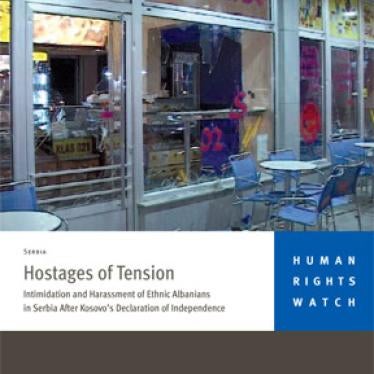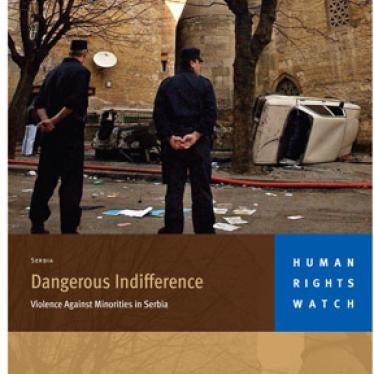(Belgrade, November 3, 2008) - Serbian authorities failed to prevent attacks against businesses and homes owned by ethnic Albanians in the wake of Kosovo's declaration of independence (by the majority ethnic Albanian government) in February 2008 or to bring to justice those responsible, Human Rights Watch said in a report released today. Serbia's treatment of ethnic minorities is likely to be critically assessed in the European Commission's annual progress report on Serbia, to be published on November 5.
The 74-page report, "Hostages of Tension: Intimidation and Harassment of Ethnic Albanians in Serbia after Kosovo's Declaration of Independence," documents attacks against ethnic Albanians and other minorities in February and March 2008, including broken windows in businesses and homes, attempted arson, hate graffiti and intimidating protests. Most took place in the ethnically diverse Vojvodina region, in northern Serbia.
The Serbian government's response was inadequate. The police failed to take preemptive action to protect property, despite a pattern of similar attacks in the past linked to protests over Kosovo. On the positive side, they often patrolled outside property once it had been attacked. But none of the 18 cases in the report resulted in criminal charges or misdemeanor proceedings, even when police were present during the attacks.
"Serbia needs to show it is serious about stopping these attacks," said Wanda Troszczynska-van Genderen, Balkans researcher at Human Rights Watch. "It needs to prosecute the attackers and be quicker to act when tensions rise."
Violence against minorities is not new in Serbia. Ethnic Albanians were targeted in 1999 during the NATO bombing campaign, carried out after a brutal military campaign against Kosovo civilians in response to a separatist rebel movement.
Human Rights Watch reported in 2005 on a wave of violence against minorities in March 2004, as ultranationalists reacted to news of anti-Serb violence in Kosovo by attacking ethnic Albanians, other Muslims, and Roma. The police during that period made little effort to protect vulnerable locations or to pursue aggressively prosecutions of the perpetrators. Those who were convicted often received lenient sentences.
The new Human Rights Watch report looks at the official response to the 2008 violence. It concludes that little has changed since the previous round of violence. Indeed, in one important respect - prosecuting the suspected attackers - the authorities appear to have become more complacent.
On November 5, the European Commission will publish its annual assessment of Serbia's progress toward meeting the criteria for closer integration with the European Union, through the Stabilization and Association process. The protection of minorities in Serbia is a benchmark for upgraded EU ties.
"Violence against minorities remains a real concern in Serbia," said Troszczynska-van Genderen. "Serbia cannot hope to move closer toward the European Union unless it shows it won't tolerate the violence."
Ethnic Albanians whose businesses and homes were attacked told Human Rights Watch that they had seen the police standing by without acting as ultra-nationalists threw stones at property during demonstrations. The police contend that it was not always feasible to take strong action during and following demonstrations, when officers were outnumbered by angry protesters.
Whatever the merits of their arguments for failure to act during the attacks, Human Rights Watch is concerned that in most cases the police appear to have done little to identify or to pursue the perpetrators vigorously - even in situations where police officers were themselves witnesses, or where other witnesses or CCTV footage were available.
The information received from Serbian authorities by Human Rights Watch was often incomplete, making it difficult to assess accurately and fully the official response of both the police and the justice system. But in addition to the fact that none of the cases reviewed by Human Rights Watch resulted in prosecutions, it is clear that few, if any, of 221 Kosovo-related incidents recorded by police between February 17 and March 20 (whether targeting ethnic minorities or otherwise) resulted in any criminal charges or prosecutions.
The structural problems preventing an effective response to minority violence that were identified by Human Rights Watch in 2005 have yet to be addressed. Serbia continues to lack a hate crimes law, which would elevate ethnically motivated violence out of the category of ordinary crimes. Minorities are still grossly underrepresented in the police force, a legacy of the nationalistic government of former Serbian President Slobodan Milosevic during the 1990s, when non-Serbs were virtually excluded from its ranks.
Serbia's new coalition government, formed in June 2008, has yet to take up the issue of violence against minorities. The report includes recommendations to the new government to curb anti-minority violence. In addition to enacting a hate crimes law and increasing minority representation in the police, the recommendations include prompt and unequivocal government condemnation of offenses against minorities, and better coordination between the police, judges and prosecutors.
"Serbia's new government needs to show both perpetrators and victims that violence against minorities will not be tolerated," said Troszczynska-van Genderen. "Above all, it should bring those who attack minorities to justice."








